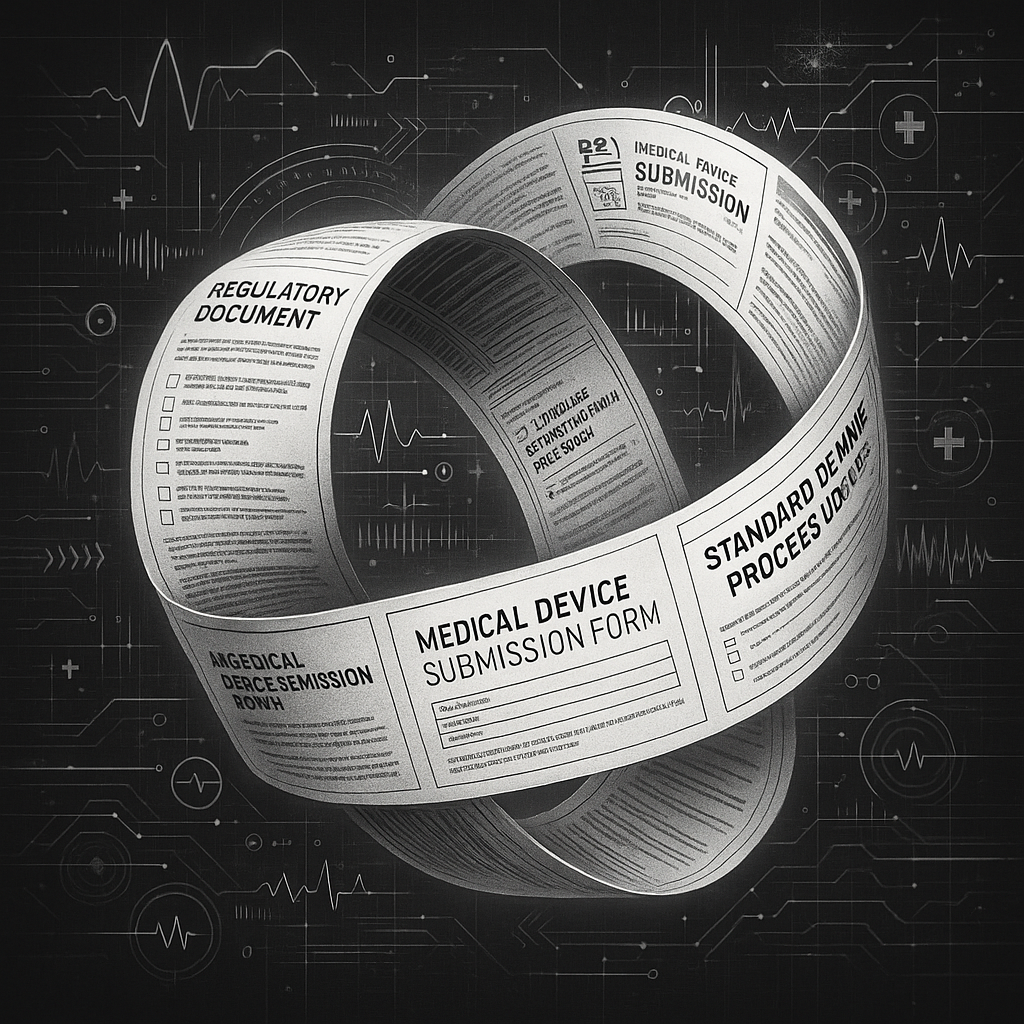
The Regulatory Status Quo Is Dead (And Artificial Intelligence Killed It)
MedTech regulatory teams are shifting from document-heavy workflows to AI-powered predictive systems in 2025. Modular content libraries, structured claims management, and machine learning transform MLR reviews while reducing submission timelines. Traditional static approaches create bottlenecks as patent cliffs drive faster launches across multiple jurisdictions.

Global Artificial Intelligence Rules Are Coming Fast And Out Of Sync
A breakthrough AI diagnostic passes FDA review but triggers high-risk classification in Europe. The same algorithm, trained on global datasets, is rejected by China's regulators. As AI medical device rules fracture across borders, SaMD startups discover that regulatory approval in one market guarantees nothing elsewhere.

Why Your Regulatory Strategy Feels Like A Shot In The Dark
Fragmented guidance documents, trial outcomes, and device data don’t just slow down strategy—they distort it. When regulatory plans ignore the full picture, startups risk repeating errors or overlooking key signals. Smart teams are connecting the dots before their next submission is even in draft.

Your "Finished" Regulatory Submission Is Actually Just Getting Started
Submission timelines don’t stop at approval. When regulatory frameworks shift mid-cycle or rationale documents vanish with a departing team member, what’s left behind is risk. Discover how MedTech startups can design regulatory systems that adapt, retain context, and strengthen every future interaction with regulators.

The 23-Minute Problem Killing Your Regulatory Strategy
Context switching costs MedTech regulatory teams weeks per submission cycle as professionals lose 23 minutes of focus with each system jump. New cognitive research explains why fragmented workflows between PDFs, databases, and email threads increase stress 67% while reducing strategic clarity. The $450 billion productivity crisis is rooted in how the human brain processes regulatory information.

Regulatory Memory Lost Can Cost More Than Time
Medical device companies risk losing vital regulatory knowledge when employees leave. To address this, leading MedTech firms implement institutional memory systems that preserve and share regulatory intelligence, streamlining submissions to bodies like the FDA and EMA. This approach reduces compliance risks and fosters innovation, creating a competitive edge in the industry.

Regulatory Borders Are Blurring, But Your Compliance Strategy Still Needs Sharp Lines
The billion-dollar question haunting every medical device startup: Can we finally build one quality system for both sides of the Atlantic? The FDA's new QMSR and the EU MDR both reference ISO 13485, creating a misleading impression of regulatory harmony. Startups treating these systems as interchangeable often face compliance catastrophes, inspection delays, and documentation disasters that can torpedo market launches before they even begin.

How Global Regulatory Trends Are Quietly Shaping FDA Reviews
Global regulators are converging on how they evaluate AI and software in medical devices. The IMDRF’s 2025 guidance, FDA-EMA alignment, and new international standards are redefining what compliance means—shaping U.S. submissions and timelines for global startups entering the MedTech market.

Solving The Speed And Compliance Puzzle For MedTech Startups
MedTech startups balancing global growth and compliance face a critical challenge: how to move fast without regulatory missteps. With limited resources and shifting guidance, AI-powered tools offer startup-specific solutions that prioritize only what’s relevant, align with risk tolerance, and enable speed without sacrificing accuracy or global readiness.

Inside The FDA's New Cybersecurity Expectations For Premarket Submissions
U.S. Food and Drug Administration (FDA) cybersecurity guidance 2025 transforms medical device submissions with mandatory SBOMs, threat models, and architecture documentation. Poor cybersecurity hygiene triggers automatic rejections under Section 524B authority. AI-powered regulatory systems provide the traceability that traditional methods cannot achieve.

The Strategic Alliance Between Human Experts, Automation, And Artificial Intelligence
Outdated manual processes are hindering the ability of MedTech startups to achieve success in regulatory compliance. As the industry evolves and regulatory requirements become increasingly complex, these traditional methods can lead to delays and inefficiencies. The most effective strategies center on integrated tools, human oversight, and scalable systems built for modern regulatory demands.

The Regulatory Guidance Maze That's Quietly Strangling MedTech Growth
Fragmented folders and outdated tools are hindering regulatory teams' efficiency. MedTech leaders are changing the game by implementing structured intelligence systems to minimize submission delays, lower compliance risks, and transform guidance overload into a growth strategy. Here’s how the top performers are gaining an advantage.

Your Next Approval Lives In Your Regulatory Data
Regulatory professionals struggle with overwhelming FDA, EMA, and MHRA data that never translates into actionable strategies. Smart MedTech teams systematically transform fragmented regulatory intelligence into predictive submission roadmaps, accelerating approvals and gaining a competitive advantage. Strategic frameworks transform compliance chaos into market domination by analyzing proven global regulatory precedents.

Why Your Regulatory Filing System Is Sabotaging Your Next Submission
Legacy folder systems weren’t built for the pace or complexity of modern MedTech. When regulatory updates hit, disconnected documents and outdated storage slow everything down. Project-based organization turns fragmented guidance into actionable strategy, built for how teams actually work.

Cut Costs And Accelerate Approval By Learning From Competitor Trials
MedTech startups waste millions on preventable clinical trial failures while competitor intelligence sits in plain sight. For each trial amendment, startups may face six-figure costs; yet, most companies overlook the goldmine of regulatory insights available in public databases. AI-powered competitive analysis transforms trial design, slashes development costs, and accelerates FDA approvals for forward-thinking startups.

Stop Drowning In Regulatory Guidance And Start Swimming Ahead
Regulatory guidance document overload is crushing MedTech startups with 190+ new FDA documents in 2023 alone. While the majority of companies rely on fragmented spreadsheets and email folders. While many teams still rely on fragmented tools, such as spreadsheets and email folders, to manage updates, forward-looking startups are building centralized regulatory intelligence systems that streamline compliance and accelerate submissions.

Eliminating Regulatory Silos Through Collaborative Intelligence Platforms
When regulatory knowledge remains trapped in information silos across individual drives and email folders, MedTech startups face compliance risks that derail market entry. Collaborative regulatory intelligence systems eliminate person-dependent workflows, break down silos, preserve institutional memory, and accelerate submissions.

The Regulatory Intelligence Revolution Medical Device Companies Need Now
Traditional search tools fail regulatory professionals with irrelevant results and fragmented data, increasing compliance costs for medical device companies. Purpose-built regulatory intelligence platforms transform global compliance work, reduce operational expenses, and accelerate time-to-market. AI-enhanced solutions move regulatory teams beyond document retrieval to answer extraction in today's complex regulatory landscape.

Regulatory Knowledge Should Be a Living Library, Not a Static Archive
Regulatory blind spots are silently killing MedTech innovation timelines. While thousands of successful submissions hold strategic gold, teams waste 15+ hours weekly hunting through fragmented databases and outdated folders. Discover how transforming static records into dynamic regulatory intelligence can slash review cycles, neutralize compliance risks, and turn regulatory precedents into your most powerful competitive advantage in 2025.

When Regulatory Teams Spend More Time Searching Than Strategizing
Regulatory disarray is quietly derailing MedTech innovation. As guidance documents multiply and submission timelines slip, startups face mounting risk from scattered research, outdated precedents, and fragmented workflows. See how early-stage teams can reclaim time, reduce costs, and turn regulatory clarity into a competitive edge in 2025.